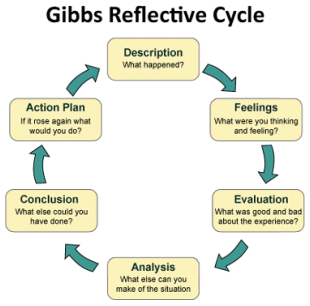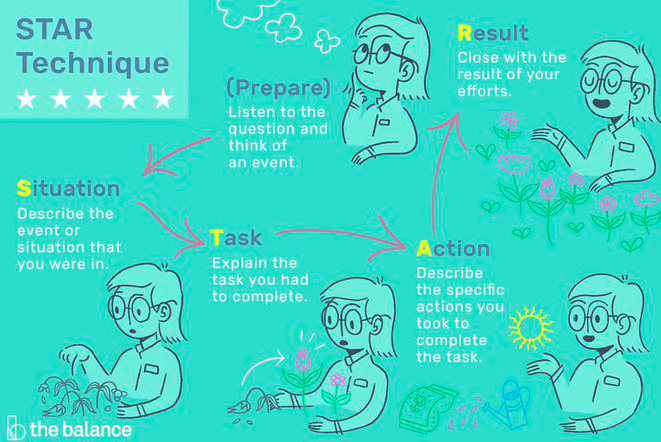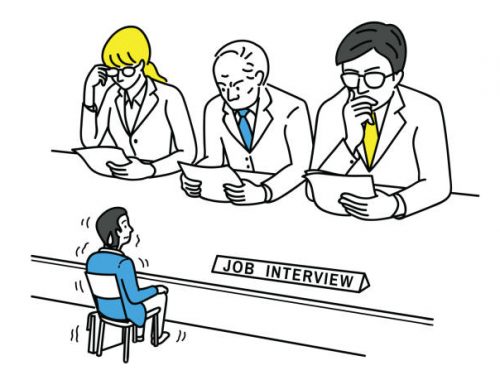It Just Has to be Done
I am sure we all share a mutual feeling toward job interviews, a feeling of dread or even fear. Despite this, it is one of the many hurdles in life that at some point must be crossed (even though we all wish it could be avoided). My work placement module decided to challenge us with this particular hurdle, conducting stimulated interviews based on a real job in our desired sectors. In small groups with my fellow students, we had to prepare questions for the group jobs whilst preparing for our own interviews. The following blog will use the Gibbs reflective cycle to reflect and analyse my preparation and performance in my stimulated interview.
The Gibbs reflective cycle consists of six sectors: description, feelings, evaluation, analysis, conclusion, and action plan, and I have decided to employ this cycle due to its consideration of all details. As McMillian and Weyers (2013, 33) claim, the Gibbs reflective cycle ‘described the different processes of reflection as part of a cyclical pattern of behaviour.’

Description
The stimulated interviews, lasting ten minutes each, were based on a real job currently being advertised. After some research, I chose an assistant producer role at Little Dot Studios as I believed I had the relevant experience necessary. I structured my answers around the skills and experience needed and expected of the job, such as the ability to work as part of a team on production planning and the ability to bring client briefs to life. Preparation is a fundamental step needed for a successful interview and whilst I did not know the questions that would be asked, I dedicated time to perfect answers that would answer a variety of basic interview questions. I ensured they would fit the role while showcasing my confidence and passion for the job.
Feelings
Throughout my interview preparation, I felt comfortable in my ability to answer the questions correctly; however, this was with my notes in my hand and furthermore in the comfort of my bedroom. I knew the real thing would feel very different, and I was not wrong. On the morning of, a feeling of anxiousness took over; what if I forget what I’m meant to say? What if I stumble on my answers? I suppose these are normal thoughts and feelings, however, I had to be rational; I have completed many interviews in the past with part-time jobs; they were never that bad.
Evaluation and Analysis
In terms of preparation, I believe my time spent planning before the interviews was worthwhile as my interview itself went well. I was able to use the S.T.A.R technique when answering my questions, S.T.A.R meaning situation, task, activity, and result. Using this technique provided my answers with a fluency as Higgins (2014) claims ‘used at its best, the Star structure is invisible to the listener and it simply comes across as a well-articulated example.’ My use of this technique allowed me to draw upon my skills whilst offering an example to back up what I was stating.

Upon reflection, I believe my strengths lay in creating answers that were specific to the job role, highlighting how I overcame challenges and, through my presentation. At all times throughout the interview, I was subconsciously considerate of my body language and eye contact as I am aware of the importance of positive body language and the emotion it may suggest. As Sonali Ganguly (2017, 67) reminds us ‘sitting straight, leaning forward or any kind of body posture clearly conveys the level of confidence of the candidate. Change in the posture exhibits confidence, whereas stiff postures may reflect nervousness,’ with this in mind, I maintained eye contact whilst also posing myself in a comfortable yet professional position. Despite this, I am aware of my flaws, for example, my overall pace was quicker than I wanted and realised this was down both to nerves and trying to fit all I could remember into my answers.
Conclusion
In terms of what more I could have done, I believe based on my feedback that I could have slowed down the overall pace of the interview and asked more questions at the end. My feedback stated that I should be prepared to know the company and its ongoing projects and that if I were to do the interview again, I would ensure I ask questions at the end of the interview.
Action Plan
For future interviews, taking my feedback into consideration, I would maintain my level of confidence in terms of my interview content but concentrate on slowing my pace through remaining calm and researching suitable questions to ask at the end of the interview. Overall, the stimulated interview process was extremely beneficial, despite dreading the day beforehand, and allowed me to highlight my strengths and weaknesses, preparing me for life after university.
Bibliography
Ganguly, Sonali. ‘Understanding Nonverbal Cues: A Key to Success in Interviews.’ Journal of Soft Skills. Vol.11, No.2, 2017.
Higgins, Michael. ‘Using the Star Technique to Shine at Job Interviews: a How to Guide, The Guardian. 10th March 2014.
McMillian, K and Weyers, J. (2013) How to Improve your Critical Thinking and Reflective Skills, Harlow: Pearson Education UK.
AEL 3001 Blog Post 2
You May Also Like

Simulated Interviews: A Pointless Exercise?
14 February 2022
9 February 2022

